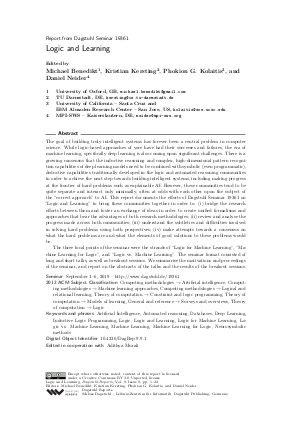Logic and Learning (Dagstuhl Seminar 19361)
Authors Michael Benedikt, Kristian Kersting, Phokion G. Kolaitis, Daniel Neider and all authors of the abstracts in this report
-
Part of:
Issue:
Dagstuhl Reports, Volume 9, Issue 9
Part of: Volume: Dagstuhl Reports, Volume 9
Part of: Journal: Dagstuhl Reports (DagRep) - License:
 Creative Commons Attribution 3.0 Unported license
Creative Commons Attribution 3.0 Unported license
- Publication Date: 2020-02-19
File

PDF
DagRep.9.9.1.pdf
- Filesize: 4.19 MB
- 22 pages
Document Identifiers
Subject Classification
Keywords
- Artificial Intelligence
- Automated reasoning
- Databases
- Deep Learning
- Inductive Logic Programming
- Logic
- Logic and Learning
- Logic for Machine Learning
- Logic vs. Machine Learning
- Machine Learning
- Machine Learning for Logic
- Neurosymbolic methods
Metrics
- Access Statistics
-
Total Accesses (updated on a weekly basis)
0Document
0Metadata
Abstract
The goal of building truly intelligent systems has forever been a central problem in computer science. While logic-based approaches of yore have had their successes and failures, the era of machine learning, specifically deep learning is also coming upon significant challenges. There is a growing consensus that the inductive reasoning and complex, high-dimensional pattern recognition capabilities of deep learning models need to be combined with symbolic (even programmatic), deductive capabilities traditionally developed in the logic and automated reasoning communities in order to achieve the next step towards building intelligent systems, including making progress at the frontier of hard problems such as explainable AI. However, these communities tend to be quite separate and interact only minimally, often at odds with each other upon the subject of the ``correct approach'' to AI. This report documents the efforts of Dagstuhl Seminar 19361 on ``Logic and Learning'' to bring these communities together in order to: (i) bridge the research efforts between them and foster an exchange of ideas in order to create unified formalisms and approaches that bear the advantages of both research methodologies; (ii) review and analyse the progress made across both communities; (iii) understand the subtleties and difficulties involved in solving hard problems using both perspectives; (iv) make attempts towards a consensus on what the hard problems are and what the elements of good solutions to these problems would be. The three focal points of the seminar were the strands of ``Logic for Machine Learning'', ``Machine Learning for Logic'', and ``Logic vs. Machine Learning''. The seminar format consisted of long and short talks, as well as breakout sessions. We summarise the motivations and proceedings of the seminar, and report on the abstracts of the talks and the results of the breakout sessions.
Cite As Get BibTex
Michael Benedikt, Kristian Kersting, Phokion G. Kolaitis, and Daniel Neider. Logic and Learning (Dagstuhl Seminar 19361). In Dagstuhl Reports, Volume 9, Issue 9, pp. 1-22, Schloss Dagstuhl – Leibniz-Zentrum für Informatik (2020)
https://doi.org/10.4230/DagRep.9.9.1
BibTex
@Article{benedikt_et_al:DagRep.9.9.1,
author = {Benedikt, Michael and Kersting, Kristian and Kolaitis, Phokion G. and Neider, Daniel},
title = {{Logic and Learning (Dagstuhl Seminar 19361)}},
pages = {1--22},
journal = {Dagstuhl Reports},
ISSN = {2192-5283},
year = {2020},
volume = {9},
number = {9},
editor = {Benedikt, Michael and Kersting, Kristian and Kolaitis, Phokion G. and Neider, Daniel},
publisher = {Schloss Dagstuhl -- Leibniz-Zentrum f{\"u}r Informatik},
address = {Dagstuhl, Germany},
URL = {https://drops.dagstuhl.de/entities/document/10.4230/DagRep.9.9.1},
URN = {urn:nbn:de:0030-drops-118425},
doi = {10.4230/DagRep.9.9.1},
annote = {Keywords: Artificial Intelligence, Automated reasoning, Databases, Deep Learning, Inductive Logic Programming, Logic, Logic and Learning, Logic for Machine Learning, Logic vs. Machine Learning, Machine Learning, Machine Learning for Logic, Neurosymbolic methods}
}
